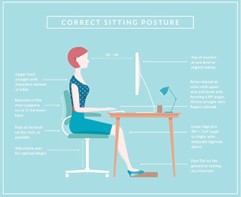Are you sat at a desk all day? Or involved with repetitive lifting or bending? Does your posture have room to improve?
Firstly, why is posture so important?
- Poor posture, especially in the neck and shoulders, places more weight and stress through your spine, muscles, ligaments and joints.
- Poor posture distorts the information as it travels through your nervous system to your brain, so your brain has less accurate information about what is going on in your body is.

Poor posture (as your head and shoulders drift forward) changes the mechanics of how your joints, muscles and ligaments work. As your head moves forward, it ‘weighs’ more – just like if you held a bowling ball out away from your body it feels heavier and is harder to hold up. At Energise Chiropractic Shrewsbury can analyse your posture and determine how much your head ‘weighs’ by taking a computerised picture of your posture. You can appreciate that if your head ‘weighs’ more, you will be using the muscles in your neck and shoulders more than you should – causing undo stress in this area. Regular chiropractic care could improve your posture, therefore reducing this extra stress through your neck and shoulders. This can cause neck pain, headaches and pain into your shoulders.
Recent research shows how information being sent to your brain is distorted with poor posture. Imagine there is a coin at the bottom of a shallow pool, and this pool is still and crystal clear. You can see exactly where the coin is (good posture). Now throw a pebble into the same pool – due to the ripples, you cannot see the coins position as clearly. This is how your brain sees your body when your posture is less than optimal. Postural changes can therefore impact your coordination, balance and spatial awareness.
There are two things to think about when it comes to posture: conscious control and subconscious control
- Conscious control: remembering or being told to sit or stand up straight
- Subconscious control: what your posture is like when you are not actively thinking about it. For example, when you are engrossed in your work.
As you can guess, you can help yourself with the conscious part. But what about the subconscious?
When your brain is not fully aware of what is happening in your body, it might be that your brain doesn’t realise the poor postural habits you have. By increasing the communication between your brain and body, your brain becomes more aware over time of what’s going on and if this is correct. By helping that flow of information, your subconscious (brain) will start to change and improve your postural habits. We can do this by locating and correcting your subluxations – those parts of your spine that are stiff and stuck. When the alignment and motion improves in your spine, your nerves are able to work properly, by sending more information between your brain and body. Research shows that subluxations increase stress and interference on your nervous system which reduces how well your body communicates with your brain. By having your spine checked for subluxations and getting these corrected, your brain will have more accurate control over your posture.
